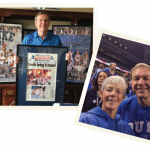
Wasn’t the NCAA final a great game? It was a titanic struggle, full of drama and excitement, as two top teams—the University of Kansas and the University of Memphis—battled for the championship. While I could say the game had ebbs and flows, when basketball is played at that level of intensity, tidal waves and rip tides would be more appropriate terminology.
When my Blue Devils exited in the second round, I switched my allegiance to the other North Carolina teams, first to upstart Davidson (Didn’t you love watching Stephen Curry, a thin reed among the trees, blessed with a silky jump shot?) and then to the usually hated Carolina. When the finals came, I really didn’t have a team to root for and I would have been equally happy whatever the outcome as long as the game was closely fought.
The match-up lived up to promise and the last two minutes of regulation time were thrilling. Whether the turn of events was a heroic comeback or a mortifying collapse is a matter of perspective. I had to stay up after my bedtime to watch the overtime period, but it was great TV and worth every minute, even if American Idol had a higher rating that week.
Medicine Through a Basketball Lens
At this point, I am sure, Dear Reader, you are asking what basketball has to do with the practice of medicine. This is The Rheumatologist after all, not Sports Illustrated, and I know that you want information about our profession, not the musings of a Frank Deford wannabe. For those of you who read this column, you know that I like to write about sports because, in our society, sports are a metaphor for everything. Under the aegis of TV, sports has exploded in importance as the games of children have become a focus of billions of people who are told that these games have transcendent meaning.
Today, I heard a commentator on TV say that the Masters golf tournament “thrills the soul and replenishes the spirit.” Wow, I thought, that sounds very inspiring, but it is utter malarkey. Although sports have been touted far beyond what it is reasonable, they do provide a picture of human nature and, in sometimes bizarre ways, can illuminate other endeavors, such as medicine.
Patience, my friends, patience. Please wait and you will see where I am going.
Anyway, what intrigued me about the tournament was the attention accorded to the coaches. Just as pro basketball is a game of players, college basketball is a game of coaches. They are the stars and the marquee attractions, and often eclipse the players in fame. The players, alas, appear interested in being student-athletes until eligible for the pro draft. Despite their professed allegiance to their alma maters, however, college coaches are migratory birds, ready to take flight for a better offer. Coaches get big bucks, with University of Kansas coach Bill Self’s victory in the NCAA final allegedly netting him a raise to over $2 million a year.

